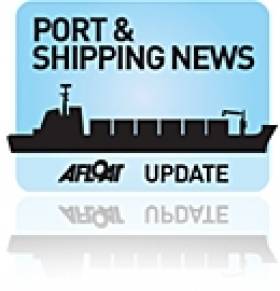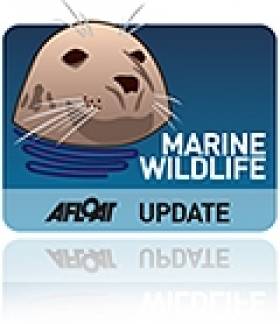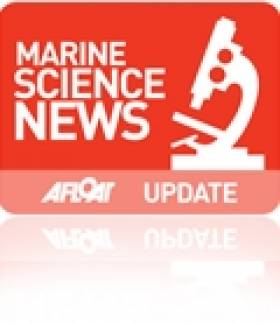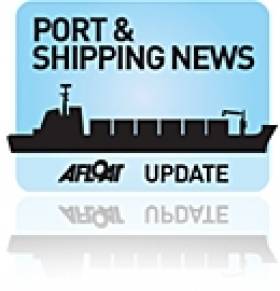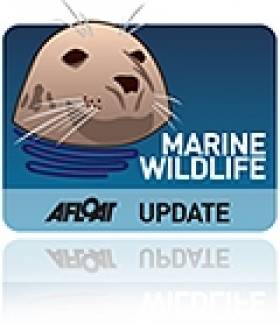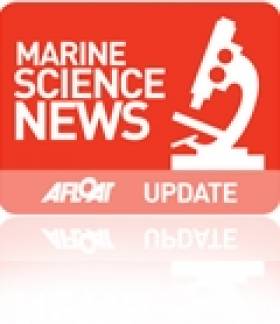Displaying items by tag: Marine Institute
Delegates Discuss Shortsea Shipping Sector in Dublin
Two hundred delegates, including many of Europe's senior port and shipping executives, gatheredfor the Annual European Shipping Congress at Dublin Castle, today (29th, June 2010) to discuss the current state of the European Shortsea shipping and port sector.The event, which was organised by the Irish Maritime Development Office (IMDO) was formally opened by Minister Ciaran Cuffe, Minister of State at the Department of Transport. The theme of the Congress was "strategies and opportunities for recovery in European Shortsea Shipping".Speaking at the conference Mr Fran Dodd, Logistics Manager of the Irish Dairy Board said "Competitive shortsea shipping has been fundamental to our success and is fundamental to our future" IDB export 100% of their products, including Kerrygold brand to over 80 countries worldwide.
Major Irish exporting companies such as Irish Dairy Board, Wellman International and Rusal, (the worlds largest alumina and aluminium producer with a major facility in on the Shannon Estuary), all provided key note papers on their perspective for export led recovery."This year's congress is taking place at a time when the industry is still concerned about the pace and fragility of the recovery in the European economic zone, said IMDO Director Glenn Murphy. "The European shipping sector has endured a highly turbulent 18 months which has seen shipping demand and port throughput fall right across Europe. This has resulted in most market segments having to deal with capacity issues and falling freight rates. The Congress appears optimistic but still highly cautious of the volatile nature of the recovery path for the sector"In his opening address Minister Cuff welcomed that Ireland had become a recognised location where leaders from across Europe now come to regularly discuss key shipping and port issues. "I am particularly pleased to note that, although issues such as cost and capacity where very much to the fore of the industry agenda, highly important areas such as climate change and vessel emissions were also being debated at the congress," he said.
The European Shipping Congress is now scheduled to be held in Ireland every alternate year and is scheduled to return in 2012 after being hosted in Germany in 2011.
Two hundred delegates, including many of Europe's senior port and shipping executives, gatheredfor the Annual European Shipping Congress at Dublin Castle, today (29th, June 2010) to discuss the current state of the European Shortsea shipping and port sector.
The event, which was organised by the Irish Maritime Development Office (IMDO) was formally opened by Minister Ciaran Cuffe, Minister of State at the Department of Transport. The theme of the Congress was "strategies and opportunities for recovery in European Shortsea Shipping".
Speaking at the conference Mr Fran Dodd, Logistics Manager of the Irish Dairy Board said "Competitive shortsea shipping has been fundamental to our success and is fundamental to our future" IDB export 100% of their products, including Kerrygold brand to over 80 countries worldwide.
Major Irish exporting companies such as Irish Dairy Board, Wellman International and Rusal, (the worlds largest alumina and aluminium producer with a major facility in on the Shannon Estuary), all provided key note papers on their perspective for export led recovery.
"This year's congress is taking place at a time when the industry is still concerned about the pace and fragility of the recovery in the European economic zone, said IMDO Director Glenn Murphy. "The European shipping sector has endured a highly turbulent 18 months which has seen shipping demand and port throughput fall right across Europe. This has resulted in most market segments having to deal with capacity issues and falling freight rates. The Congress appears optimistic but still highly cautious of the volatile nature of the recovery path for the sector"
In his opening address Minister Cuff welcomed that Ireland had become a recognised location where leaders from across Europe now come to regularly discuss key shipping and port issues. "I am particularly pleased to note that, although issues such as cost and capacity where very much to the fore of the industry agenda, highly important areas such as climate change and vessel emissions were also being debated at the congress," he said. The European Shipping Congress is now scheduled to be held in Ireland every alternate year and is scheduled to return in 2012 after being hosted in Germany in 2011.
Warm Water Species on the Increase Around Ireland’s Coasts
Mr. Sean Connick, T.D., Minister of State at the Department of Agriculture, Fisheries and Food, today (June 29th) launched a milestone report on the effects of climate change on Ireland’s marine ecosystems. The document - Irish Ocean Climate and Ecosystem Status Report 2009 – details a number of significant observations recorded in recent years including: increases in sea surface temperature, increased wave heights off the south west coast and an increase in the number of warm water species in Irish waters, ranging from microscopic plankton to swarms of jellyfish. This report is one of three projects funded as part of the Marine NDP Research Programme (Sea Change) under the Environmental Policy Research Measure.
“It could be argued that one of the greatest challenges our marine food industries - such as fishing and aquaculture - are the effects of marine climate change,” said Minister Connick. “These changes will be primarily driven by the Atlantic Ocean. Research is therefore urgently required to improve our capability to predict marine climate change so that we can preempt and deal with the economic, social, political and environmental consequences that might follow.”
One key finding of the report is that increases of sea surface temperature of 0.6°C per decade have been taking place since 1994, which are unprecedented in the past 150 years. This in turn is linked to an increase in microscopic plants and animals, along with species of jellyfish. Further up the food chain, increased numbers of most warm water fish species have been observed in Irish waters, along with sightings of exotic species such as snake pipefish. Declines in number of seabirds have also been observed which may have a climate link.
“Ireland is strategically placed to play a key role in monitoring ocean-induced changes in our climate and environment,” said Dr. Peter Heffernan, CEO of the Marine Institute. “Geographically the warm southern waters of the Atlantic drift come closer to Ireland than any other country in Europe, where they merge with the cooler northern waters off the coasts of Galway and Mayo. It is here that the predicted biological shifts in marine species diversity or abundance are most likely to occur, making Ireland an ideal laboratory for the study of marine climate change.”
In the long term, the Irish Ocean Climate and Ecosystem Status Report 2009 report predicts that global mean sea level may rise by up to 0.88 m by 2100. This, when combined with the increase in wave heights of 0.8 m that have already been observed off southwest Ireland, could lead to an increased threat of coastal erosion and flooding.
‘We assembled a team who extensively reviewed and analysed our extensive marine databanks on oceanography, plankton and productivity, marine fisheries and migratory species such as salmon, trout and eels with the specific aim of identifying any pattern that might be linked to climate change,” said Dr. Glenn Nolan of the Marine Institute who managed the team. “In some instances these data were painstakingly assembled over a considerable period of time, indeed one of the time series extends back over five decades.”
A second report which reviews the effect of ocean acidification in Irish waters “Ocean Acidification: An Emerging Threat to our Marine Environment - 2010” has also been completed which highlights the growing threat to marine life and fragile ecosystems around the coast as a direct consequence of increased carbon dioxide (CO2) levels in the atmosphere. The report recommends that a nationally coordinated multidisciplinary marine climate change and ecosystem monitoring programme be established that will enable better evaluations to be made of the threats posed to the marine environment and economy by ocean acidification. It emphasises closer links between climate change, ocean acidification and environmental policy development especially in relation to mitigation strategies to reduce carbon emissions.
Sea Change – A Marine Knowledge, Research & Innovation Strategy for Ireland, identified climate change as a priority area for research over the period 2007 to 2013 and this report represents a significant contribution towards achieving the objectives of the marine research programme. It addresses the need to increase our understanding of the drivers and regulators of climate so as to improve the accuracy of advice to Government while at the same time provide key inputs into the national climate change programme of the EPA. It will also improve the reliability of predictive models, and allow researchers to downscale global climate model predictions to the regional/local scale. As an island nation, it is important to continue to support investment in marine climate change research. This in turn will strengthen Ireland’s ability to develop knowledge-based scenarios on climate change impacts on the various marine sectors and include these in all future social, economic and environmental strategies.
The complete Irish Ocean Climate and Ecosystem Status Report 2009 and Report summary are downloadable from:
http://www.marine.ie/NR/rdonlyres/E581708D-6269-4941-836F-6B012DD7A4BD/0/IrishOceanClimateandEcosystemStatusReport2009.pdf
http://www.marine.ie/NR/rdonlyres/7528902D-2467-4F3E-BF21-39D81AEA4D37/0/SummaryIrishOceanClimateandEcosystemStatusReport2009.pdf
The Ocean Acidification Report can be downloaded from:
http://www.marine.ie/home/publicationsdata/publications/Marine+Foresight+Publications.htm
Marine Institute Seeks Ship-Time Programmes
The Marine Institute invites applications for grant-aid towards the cost of ship-time on-board the national research vessels (R.V. Celtic Explorer and R.V. Celtic Voyager) during 2011.
Grant-aid will be provided for ship-time to carry out ship-based research activity within defined thematic areas or dedicated undergraduate and/or postgraduate training programmes on-board the vessels. To find out more, click here.
New European Atlas of the Seas
The European Commission has recently launched a pilot version of a new European Atlas of the Seas – a dynamic online atlas where users will be able to learn more about Europe's seas, its maritime sectors, the interaction between them and the maritime policy which brings them all together.
By presenting the European Union's maritime heritage to the public in a practical and informative way, the atlas is seeking to bring fisheries and maritime policies to a wider audience. It offers detailed information on a vast array of maritime subjects and areas, such as: the volume of passengers and cargo carried to and from various destinations, the areas most affected by coastal erosion, or which Member States fish for a certain species in which sea basin.
Information on sea depths and undersea relief names, rivers and their drainage basins, tide amplitude, sea level rise, marine protected areas and many other things are also to be found.
The atlas, which will be available in English, French and German, was one of the actions outlined by the Commission when it launched an Integrated Maritime Policy for the European Union in 2007.
This pilot edition of the atlas will be further developed, and for this purpose an online survey asks users to give feedback and ideas for improvement at: http://ec.europa.eu/yourvoice/ipm/forms/dispatch?form=MARATLAS
Satellite-Linked Tagging of Porbeagle Sharks
Scientists at the Marine Institute, Galway, are working with anglers around Ireland to study the migration and diving behaviour of porbeagle sharks (Latin name - Lamna nasus) in the northeast Atlantic. Porbeagle sharks are one of the top marine predators around Ireland, but very little is known about their movement patterns in the northeast Atlantic.
Like most pelagic sharks around the world, the porbeagle shark is vulnerable to fishing pressure due to its high commercial value, slow growth rate and complicated reproductive cycle. However, there is currently no protective legislation for the species, primarily due to a lack of basic information on its biology and ecology.
Marine Institute fisheries scientist Dr. Maurice Clarke said, "Understanding the biology and spatial ecology of the porbeagle shark is key to the conservation of the species and for establishing successful ecosystem-based management strategies in the northeast Atlantic".
To study the movement patterns of porbeagles, scientists are using pop-up satellite tags. These tags are fitted harmlessly to the back of the shark and collect information on the animals' location and depth distribution, together with data on the environment in which the sharks live. Then after nine months the tags pop-up to the surface and transmit the data to polar-orbiting satellites.
With help from expert shark angler, Peter McAuley, three tags were deployed off Downings, Donegal, in September 2008. These data have provided new insight into the migration and diving behaviour of porbeagle sharks around Ireland. One shark, a juvenile male, migrated over 2400 km to Madeira off the west coast of Morocco during the wintertime. Another shark migrated to the Bay of Biscay, a region that is considered a hotspot for other shark-like species such as albacore tuna. The results also showed that porbeagle diving behaviour is linked strongly to the day-night cycle and the monthly lunar cycle.
Daragh Brown of BIM commented that, "These results are really interesting and since there isn't a whole lot known about porbeagle behaviour or habitat preference, even small amounts of data can really advance our knowledge".
This year, Marine Institute scientists are hoping to tag large adult females to find out the location of porbeagle birthing grounds. Currently nothing is known about where these large predators give birth.
The Marine Institute is currently working with the Irish Elasmobranch Group, French Research Institute for Exploration of the Seas (IFREMER), and the Association for the Conservation of Sharks (APECS) to find further funding for the project that will end in 2011. They aim to establish links between the fishing industry, recreational anglers and the public to increase research and awareness for the conservation of these sharks.
Dr. Edward Farrell (Irish Elasmobranch Group) said, "Pelagic sharks have received much global attention recently. Given the increasing pressures that threaten their survival, there is a pressing need for new research to underpin effective management measures".
Of this amount, €1.6 million (19%) went to the marine sector with a further €6 million being won in collaborative marine food related research projects across the various FP7 Thematic areas. The occasion of the Workshop, held at the DAFF Backweston Campus, Co. Kildare, was to launch a DAFF booklet highlighting the success of Irish researchers in the FP7 FAFP Programme; discuss how Ireland could increase its participation in this important funding programme and to welcome Ms Maive Rute, EC Director, FAFB Programme, who outlined the future direction and aims and objectives of the FAFB Programme which will continue until 2013.
In opening the Workshop, the Minister described the level of funding secured as "very significant and a clear demonstration of the essential need to continue Ireland's investment in R&D, particularly in relation to our most important indigenous sector and especially given the economic challenges facing both the country and the industry."
Minister Smith said that the involvement of Irish scientists and researchers in the Irish agri-food and fisheries' sciences, over the past three years, and the continuing need to emphasise the importance of industry involvement in research, demonstrated "the essential place of the Irish food sector in the Government's Smart Economy agenda."
The current economic challenges as well as those posed by climate change, energy supply and food security have all pushed agricultural and food production up both the domestic and European political agendas and have emphasised the need for international research collaboration. "These are challenges of a global nature that we simply cannot tackle in isolation, it is essential that we engage internationally to develop strategies that mitigate against and adapt to these challenges", the Minister concluded.
Ms Maive Rute, Director, Directorate E: Food, Agriculture, Fisheries, Biotechnology, outlined a vision for a bright green economy and the role of FP7. "Green" in this context refers to the Europe 2020 Strategy which sets out a vision of a resource efficient, low carbon economy, stimulating green innovation, jobs and growth. Priorities, she said would include: making industry "greener"; providing healthy food; closing the waste loop and retaining the European lead in bio-sciences and technologies.
Mr Geoffrey O'Sullivan, of the Marine Institute's European Information Desk, outlined, how in addition to the €1.6 million won by Irish researchers and SMEs under the FP7 FAFB Programme, an additional €6 million had been won in collaborative marine food related research projects across the various FP7 Thematic areas. These included seven projects related to the ecosystem approach to fisheries management and the detection of toxic algal (€3 million) funded under the Environment Programme; four SME projects related to improvements in production technologies for aquaculture and marine food additives (€2 million) supported under the Research for the Benefit of SMEs Programme and over €1 million for a project investigating the use of marine algae as biomass for biofuel.
Mr O'Sullivan pointed out that there were many opportunities for Marine Research Centres and knowledge-based SMEs to benefit from FAFB funding, particularly in relation to production efficiencies, seafood processing, health and safety and in marine biotechnology. The current level of Irish engagement in the marine food sector is very encouraging, he said, but anticipated a significant increase as new marine food research capacity established under the NDP Marine Research Sub-Programme, which includes €5.2 million DAFF/Marine Institute investment in the NutraMara Programme on Marine Functional Foods, started to kick in.
In closing the Workshop, Dr Dave Beehan, Chief Inspector, DAFF, pointed out that in the current economic climate, FP7 is one source of research funding that is not diminishing. It is increasing year on year. It is the Department of Agriculture, Fisheries and Food's stated strategy to develop internationalisation in our research system and FP7 represents the most obvious mechanism of achieving this aim.
The next call for competitive collaborative research proposals in the FP7 FAFB Programme will be launched on 30th July 2010 with closing dates for submissions in January 2011.



























